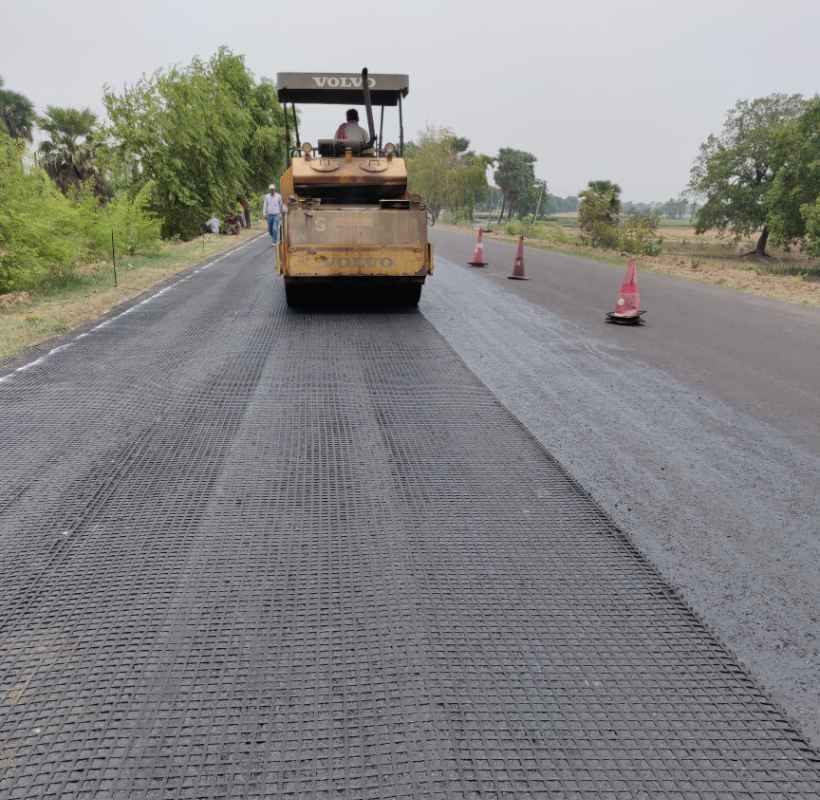Asphalt roads
What is asphalt?
Asphalt is a composite material obtained by the result of commixing mineral aggregates and the distillation by-product known as bitumen, which is obtained from petroleum. A long-lasting cost-effective product used mainly in road construction and rehabilitation, asphalt’s smooth elastic flexible features make it an indispensable raw material in the infrastructure industry. Its multiple applications range from road applications to sound insulation, waterproofing, or even roofing.
Asphalt is manufactured in specific plants where bitumen and aggregate are heated to such temperatures that they can bond properly. Such a process produces a homogenous blend, which is required to ensure the material’s functionality and longevity. Classification of asphalt depends on the mode of production and the use it is intended for:
- Hot Mix Asphalt (HMA) is manufactured at temperatures ranging from 150°C to 180°C. This type is the most widely used because of its strength and durability.
- Warm Mix Asphalt (WMA): WMA consumes less energy as its production temperature reduces, with less emission plus great quality.
- Cold Mix Asphalt: It does not require heat, and therefore applicable for patchwork and spot repairs.
What are asphalt roads?
Asphalt roads are a class of road surface consisting of multiple layers of asphalt material. The roads are valued for their smoothness, durability, and cost, which makes them the best choice worldwide. Asphalt roads are highly suitable for high-density areas such as highways, urban streets, and runways at airports
What are the benefits of asphalt roads?
Asphalt roads have many advantages; therefore, they are the choice of modern infrastructure.
1. Affordability
Asphalt is relatively cheaper than any other paving material, especially compared with concrete. It minimizes costs in terms of construction and maintenance, making it a sensible choice for large projects.
2. Durability

The strong characteristics of asphalt enable it to withstand extreme weather conditions and heavy traffic forces with minimal loss in quality. Asphalt roads can last for decades if kept in appropriate construction ways.
3. Smooth and comfortable driving experience
The smooth surface of asphalt reduces the wear and tear of vehicles while also improving their fuel efficiency. The ride is quieter and more comfortable on asphalt roads compared to other materials.
4. Noise reduction
Asphalt is flexible and thus absorbs sound, thereby reducing the resultant noise pollution created by vehicles, making it suitable for urban areas as well as residential neighborhoods.
5. Recyclability
One of the most significant environmental benefits of asphalt is its recyclability. Reclaimed asphalt can be repurposed to construct new roads, thereby minimizing waste and conserving natural resources.
6. Weather resistance
Asphalt has heat-absorbing properties that help melt snow and ice during winter. It minimizes cracking due to temperature fluctuations, ensuring long-lasting performance.
How is asphalt used in road construction?
Asphalt also plays an important role in building road networks. The principal use of asphalt is as under:
- Base layer construction consists of asphalt, which adds strength and stability to the road structure.
- Pavement surfacing: Asphalt is used to build the uppermost layer of the road, which should be smooth and durable for driving.
- Patching and repairs: Cold asphalt mix is widely used for quick repairs such as filling potholes and sealing large cracks.
- Specialized applications: Airports, seaports, and sports facilities employ asphalt due to its remarkable durability and adaptability.
Why is asphalt preferred over concrete for roads?
Although concrete has its advantages as well, in construction for roads, asphalt is usually favored due to the following:
- Quicker installation: Asphalt roads can be constructed more rapidly than concrete roads, thereby minimizing downtime and inconvenience for commuters.
- Cost-effectiveness: Asphalt is more cost-effective in both construction and maintenance.
- Flexibility: Asphalt’s ability to expand and contract with temperature changes reduces the risk of cracking.
- Ease of maintenance: Many of the deteriorated asphalt roads could be repaired easily, and relatively quickly with minimal discomfort.
How long do asphalt roads last?
The lifespan of an asphalt road depends on several factors. These include the quality of materials used, construction methods, and maintenance practices. Generally:
- Highway roads: 15-20 years with proper maintenance.
- Residential streets: 20-30 years due to lower traffic volumes.
- Parking lots: Approximately 15 years, depending on use.
Seal coating and patching are routine maintenance activities that could increase the lifespan of asphalt roadways dramatically.
How are asphalt roads maintained?
Asphalt roads are maintained through many practices that ensure their long duration and performance:
- Regular inspections: Identifying and addressing minor issues before they escalate.
- Seal coating: Applying a protective layer to prevent moisture infiltration and UV damage.
- Crack sealing: Filling cracks to prevent water from seeping into the base layers.
- Pothole repairs: Using cold mix asphalt for quick and efficient patching.
- Resurfacing: Adding a new layer of asphalt to restore the road’s smoothness and durability.
With great benefits to be derived-from cost effectiveness, durability and an environmental aspect- asphalt road bases for current infrastructure can offer nothing alike for asphalt roads in relation to maintaining flexibility, tolerance for heavy flow, changes in temperature levels, and their reusage. Thus, routine servicing methods and recent innovation such as Warm Mix Asphalt has been encouraging the efficiency of the services on the highways.
